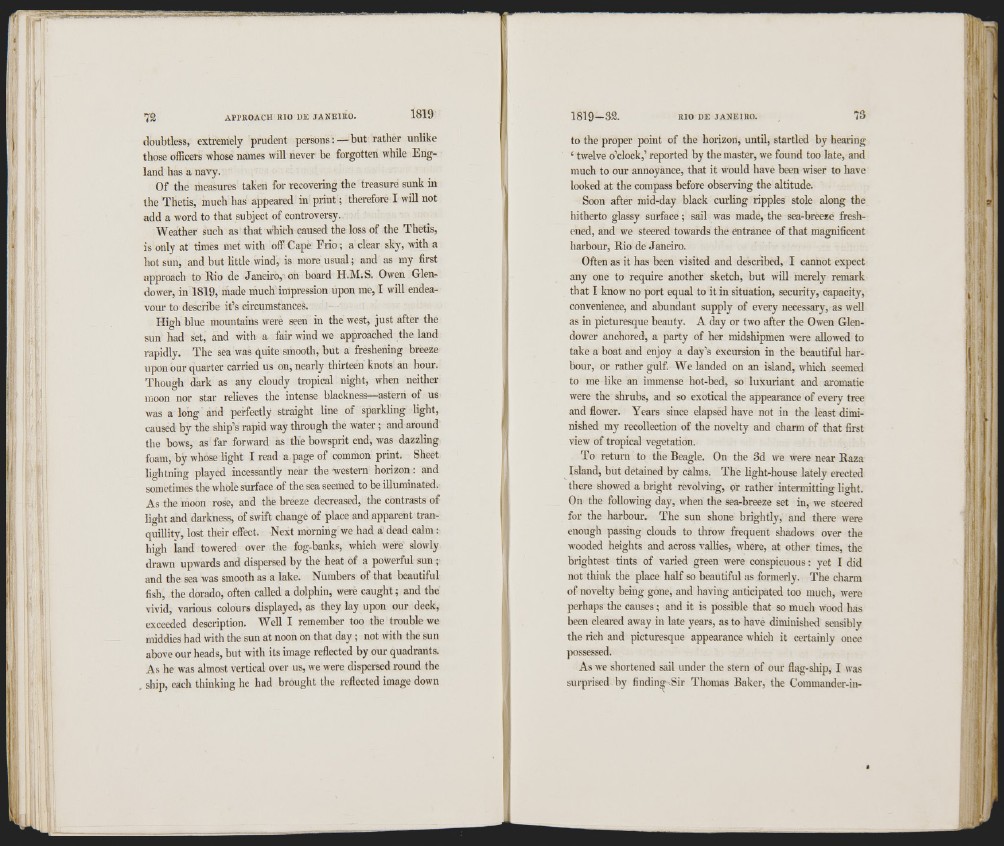
ih
I
7 :
API'ROACH lUO DK JANEIRO. 1819
doubtless, extremely prudent persons: — but rather unlike
those officers whose names will never be forgotten while England
has a navy.
Of the measures taken for recovering the treasure sunk in
the Thetis, much has appeared in p rin t; therefore I will not
add a word to that subject of controversy.
Weather such as that which caused the loss of the Thetis,
is only at times met with off Cape Frio ; a clear sky, with a
hot sun, and but httle wind, is more usual; and as my first
approach to Rio de Janeiro, on board H.M.S. Owen Glendower,
in 1819, made much impression upon me, I will endeavour
to describe it’s circumstances.
High blue mountains were seen in the west, just after the
sun had set, and with a fair wind we approached the land
rapidly. The sea was quite smooth, but a freshening breeze
upon our quarter carried us on, nearly thirteen knots an hour.
Though dark as any cloudy tropical night, when neither
moon nor star reheves the intense blackness—astern of us
was a long and perfectly straight line of sparkling light,
caused by the ship’s rapid way through the water ; and ai'ound
the bow's, as far forward as the bowsprit end, was dazzling
foam, by whose light I read a page of common print. Sheet
lightning played incessantly near the western horizon : and
sometimes the whole surface of the sea seemed to be illuminated.
As the moon rose, and the breeze decreased, the contrasts of
light and darkness, of swift change of place and apparent tranquillity,
lost their effect. Next morning we had a dead calm:
high iand towered over the fog-banks, which were slowly
drawn upwards and dispersed by the heat of a powerful sun ;
and the sea was smooth as a lake. Numbers of that beautiful
fish, the dorado, often called a dolphin, were caught; and the
vivid, various colours displayed, as they lay upon our deck,
exceeded description. Well I remember too the trouble we
middies had with the sun at noon on that day ; not with the sun
above our heads, but with its image reflected by our quadrants.
As he was almost vertical over us, we were dispersed round the
, ship, each thinking he had brought the reflected image down
I
1 8 1 9 - i RIO DE JANEIRO.
to the proper point of the horizon, until, startled by hearing
‘ twelve o’clock,’ reported by the master, we found too late, and
much to our annoyance, that it would have been wiser to have
looked at the compass before observing the altitude.
Soon after mid-day black curhng ripples stole along the
hitherto glassy surface ; sail was made, the sea-breeze freshened,
and we steered towards the entrance of that magnificent
harbour, Rio de Janeiro.
Often as it has been visited and described, I cannot expect
any one to require another sketch, but will merely remark
that I know no port equal to it in situation, security, capacity,
convenience, and abundant supply of every necessary, as weU
as in picturesque beauty. A day or two after the Owen Glendower
anchored, a party of her midshipmen were allowed to
take a boat and enjoy a day’s excursion in the beautiful harbour,
or rather gulf. W e landed on an island, which seemed
to me like an immense hot-bed, so luxuriant and ai'omatic
were the shrubs, and so exotical the appearance of every tree
and flower. Years since elapsed have not in the least diminished
my recollection of the novelty and charm of that first
view of tropical veg-etation.
To return to the Beagle. On the 3d we were near Raza
Island, but detained by calms. The light-house lately erected
there showed a bright revolving, pr rather intermitting light.
On the following day, when the sea-breeze set in, we steered
for the hai-bour. The sun shone brightly, and there were
enough passing clouds to throw frequent shadows over tlie
wooded heights and across valHes, where, at otlier times, the
brightest tints of vai-ied green were conspicuous: yet I did
not think the place half so beautiful as formerly. The charm
of novelty being gone, and having anticipated too much, were
perhaps the causes ; and it is possible that so much wood has
been cleared away in late years, as to have diminished sensibly
the rich and picturesque appeai-ance which it certainly once
possessed.
As we shortened sail under the stern of our flag-sliip, I was
surprised by iindin^^Sir Thomas Baker, the Commander-ini
=■
n
Hi